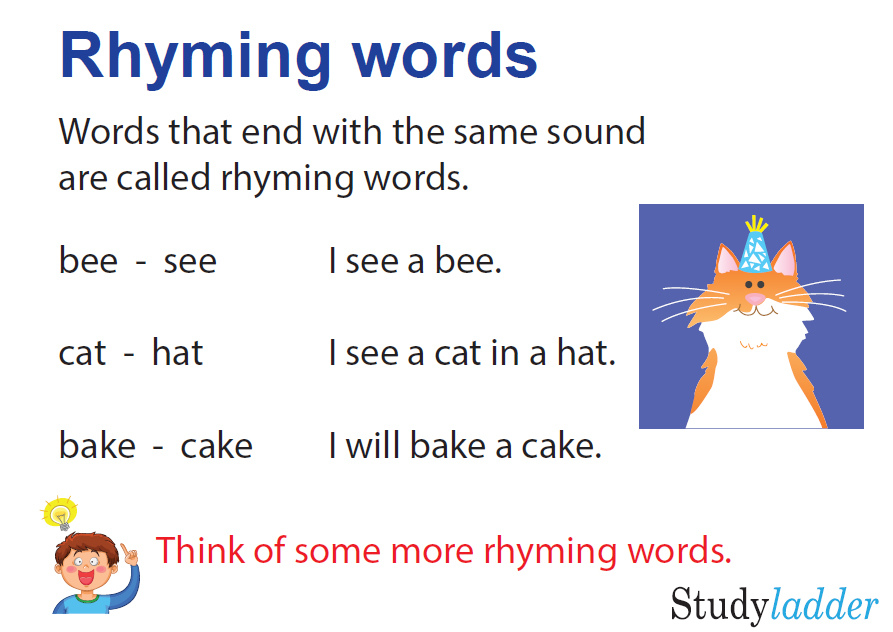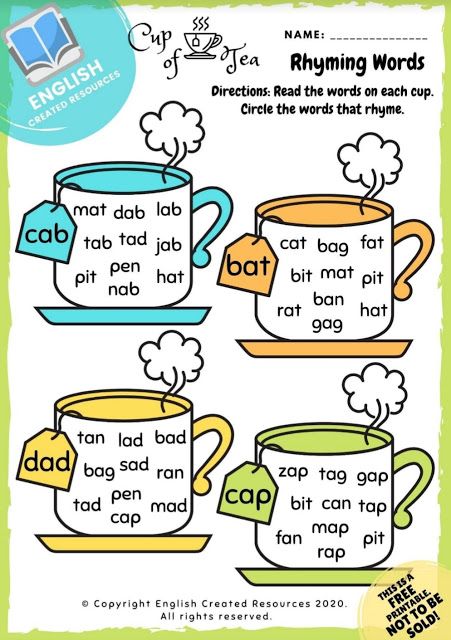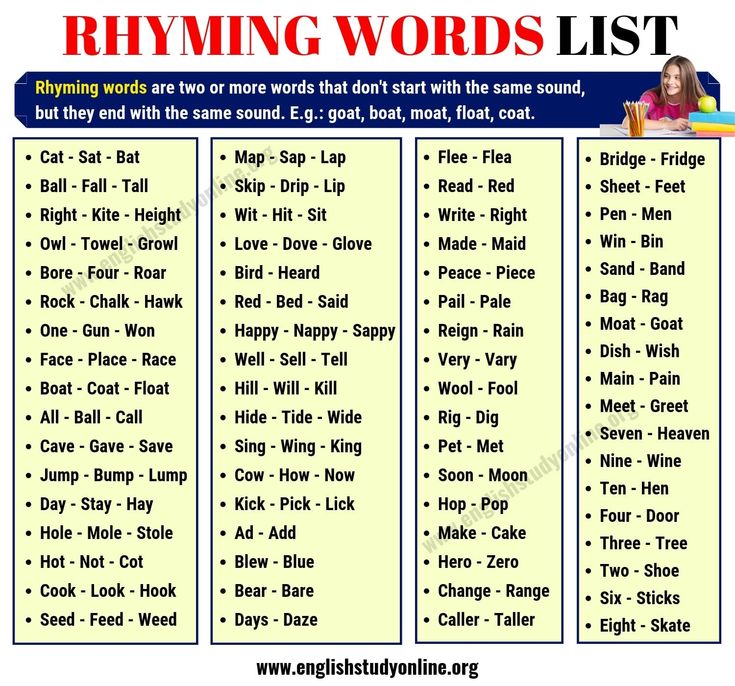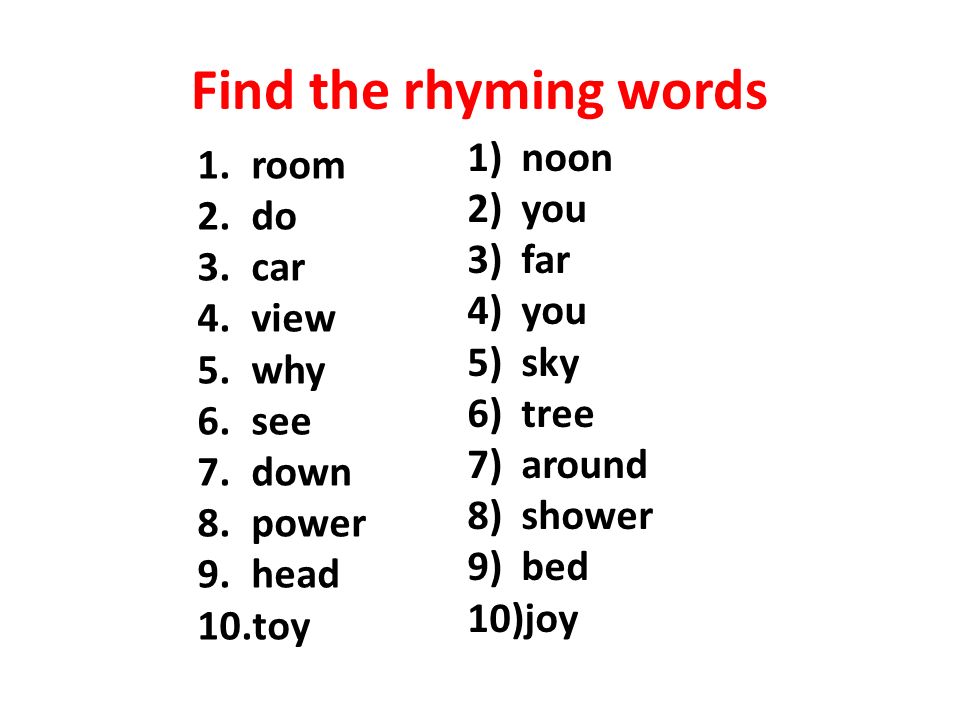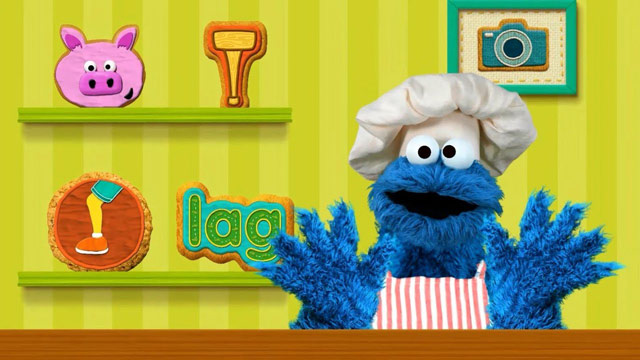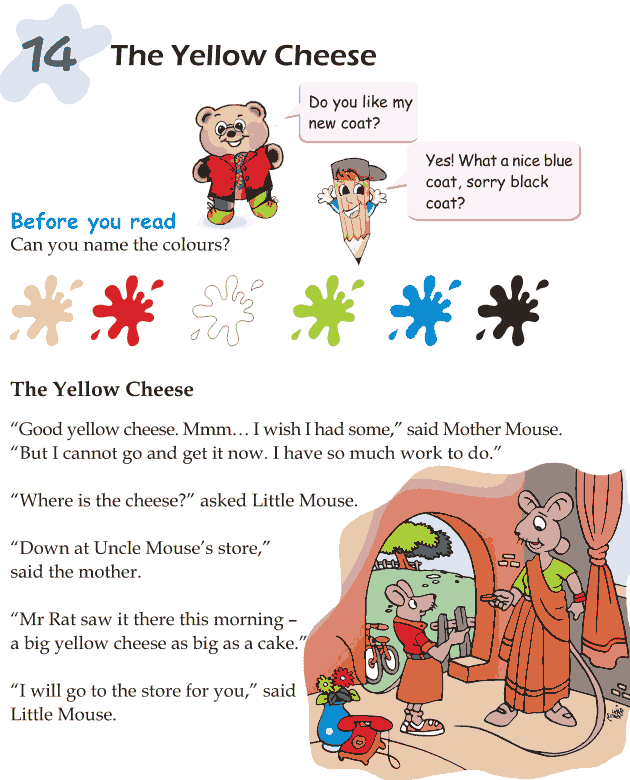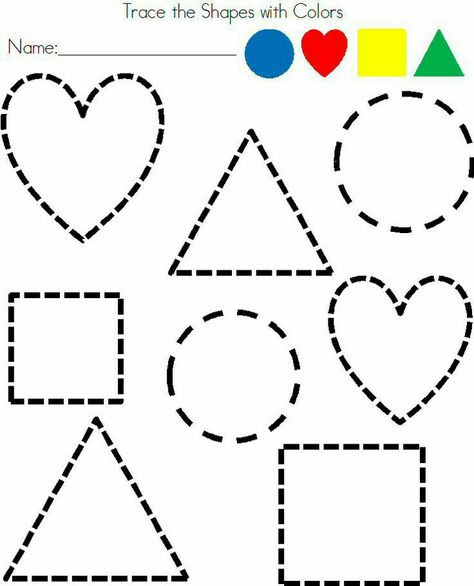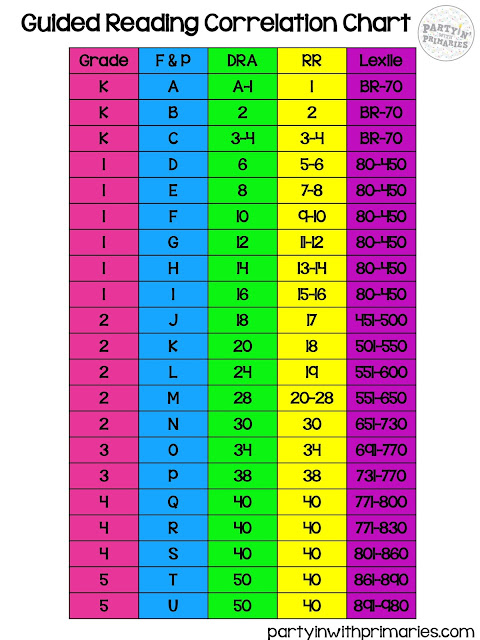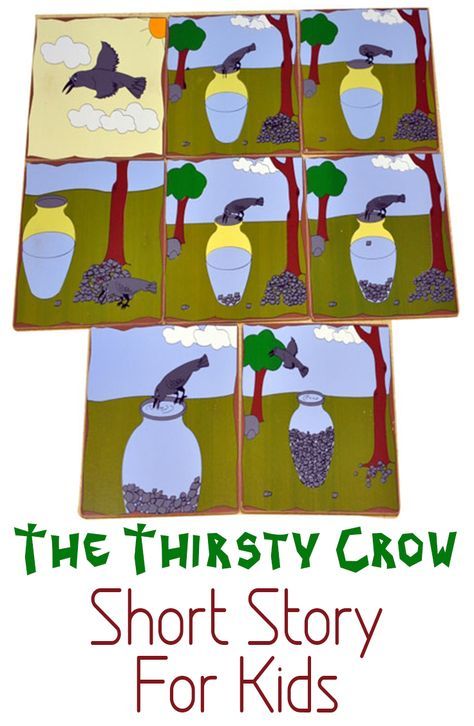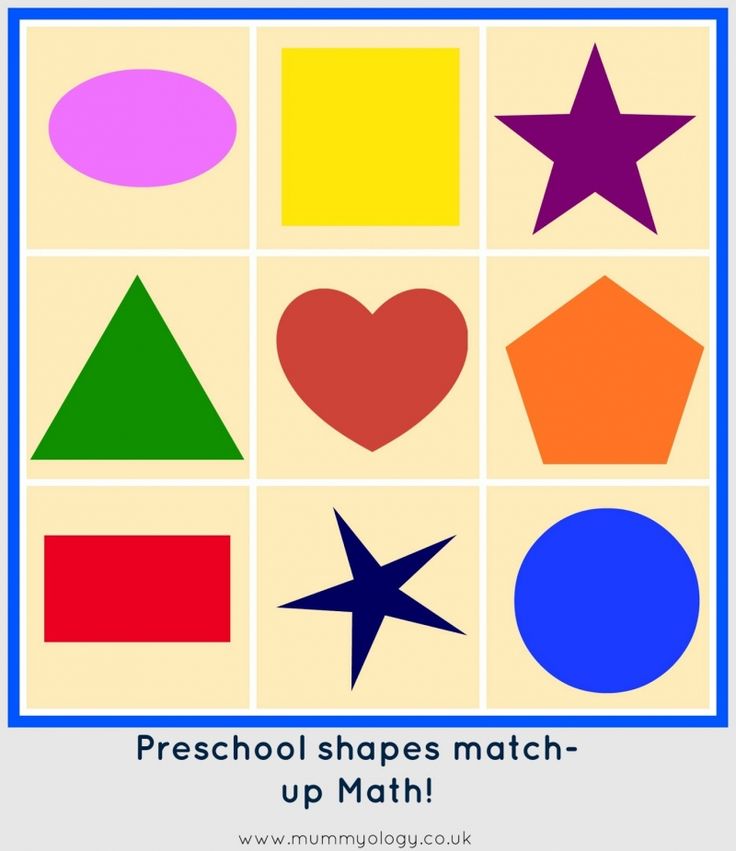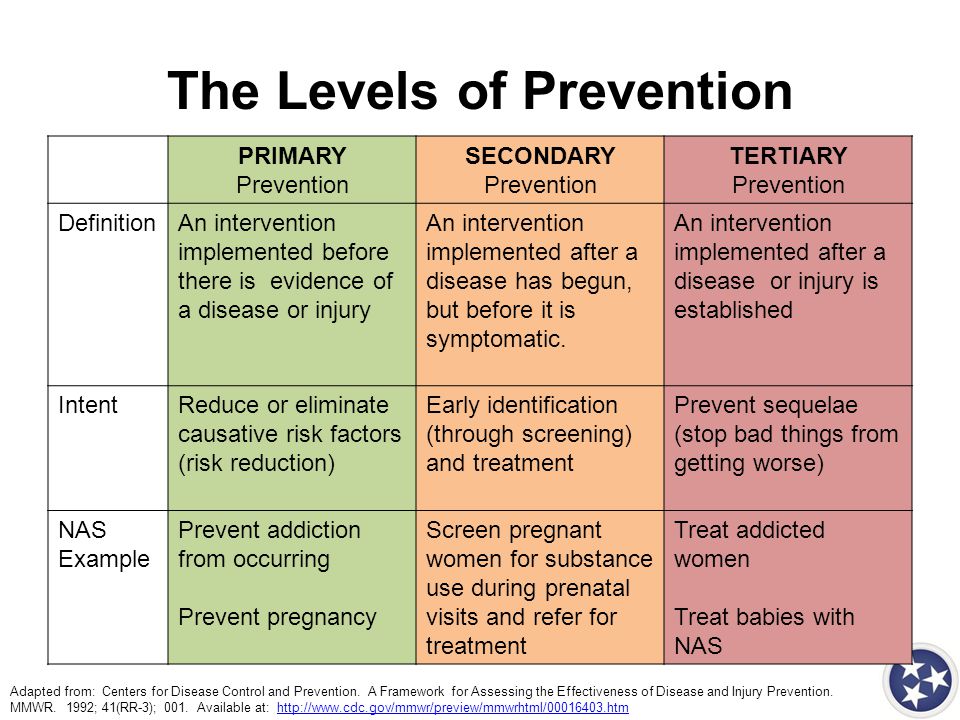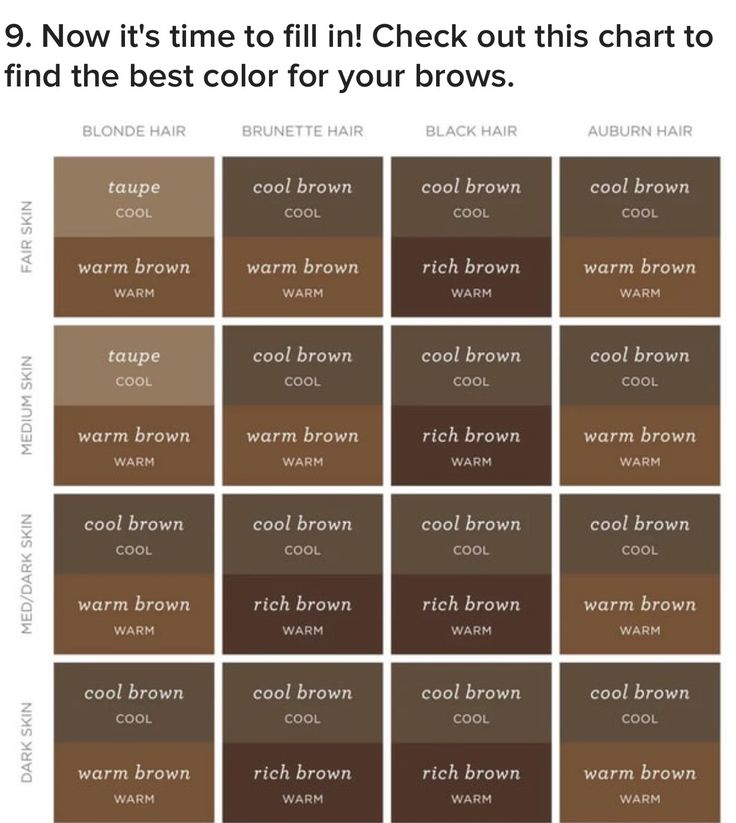About rhyming words
Rhyming Words | List of 70+ Interesting Words that Rhyme in English
by Issabella
Words that Rhyme in English! List of rhyming words. Learn 70 useful words that rhyme in English with example sentences and ESL printable infographics.
Table of Contents
What are Rhyming Words?
A rhyme is a repetition of similar sounds (usually, exactly the same sound) in the final stressed syllables and any following syllables of two or more words. In other words, rhyming words are two or more words that don’t start with the same sound, but they end with the same sound (maybe with the same letters). Some examples of rhyming words are: cat, fat, bad, ad, add, sad, etc.
Poems and songs often use rhyming to create a rhythm or a repeated pattern of sound, and sometimes poems will also tell a story. By learning these words, students will increase their sentence building and creative writing skills.
Things to remember about the difference between rhyming words and homophones:
Rhyming words have different beginning sounds, but have the same vowel and ending sounds, for example: cat/sat/pat/hat, spin/fin/chin/pin, etc. Homophones are words that sound alike but have different meanings and spellings, for example: pain/pane, hi/high/, you/yew/ewe, there/their/they’re, to/too/two.
Words that Rhyme in English
Rhyming Words List
Here is the list of 70+ words that rhyme in English.
- Cat – Sat – Bat
- Ball – Fall – Tall
- Right – Kite – Height
- Owl – Towel – Growl
- Bore – Four – Roar
- Rock – Chalk – Hawk
- One – Gun – Won
- Face – Place – Race
- Boat – Coat – Float
- All – Ball – Call
- Cave – Gave – Save
- Jump – Bump – Lump
- Day – Stay – Hay
- Hole – Mole – Stole
- Hot – Not – Cot
- Cook – Look – Hook
- Seed – Feed – Weed
- Map – Sap – Lap
- Skip – Drip – Lip
- Wit – Hit – Sit
- Love – Dove – Glove
- Bird – Heard
- Red – Bed – Said
- Happy – Nappy – Sappy
- Well – Sell – Tell
- Hill – Will – Kill
- Hide – Tide – Wide
- Sing – Wing – King
- Cow – How – Now
- Kick – Pick – Lick
- Ad – Add
- Blew – Blue
- Bear – Bare
- Days – Daze
- Flee – Flea
- Read – Red
- Write – Right
- Made – Maid
- Peace – Piece
- Pail – Pale
- Reign – Rain
- Very – Vary
- Wool – Fool
- Rig – Dig
- Pet – Met
- Soon – Moon
- Hop – Pop
- Make – Cake
- Hero – Zero
- Change – Range
- Caller – Taller
- Bridge – Fridge
- Sheet – Feet
- Pen – Men
- Win – Bin
- Sand – Band
- Bag – Rag
- Moat – Goat
- Dish – Wish
- Main – Pain
- Meet – Greet
- Seven – Heaven
- Nine – Wine
- Ten – Hen
- Four – Door
- Three – Tree
- Two – Shoe
- Six – Sticks
- Eight – Skate
Rhyme Words in English | Infographic
Categories VocabularyAll About Rhyming Words For Kids, Plus Tips For Rhyming Practice
If you’re interested in some quick and fun ways to teach rhyming words for kids, you’re in the right place.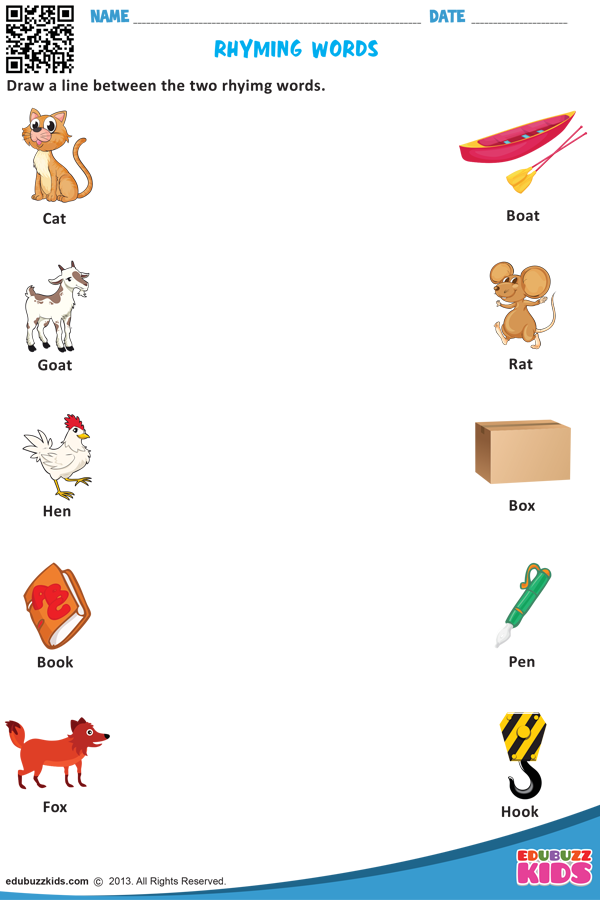 And if you’re not sure how powerful rhyming can be, just think about the impact of Dr. Seuss’s books.
And if you’re not sure how powerful rhyming can be, just think about the impact of Dr. Seuss’s books.
Why does Dr. Seuss continue to dominate children’s literature almost 30 years after his death? There are many reasons why Dr. Seuss’s books stand out from his peers’.
Besides the fact that they are incredibly fun to read, have great rhythm, and teach us all a thing or two about some of life’s lessons, his books are also easy to remember thanks to his use of rhyming.
Although rhymes seem like fun and games, they actually play an important role in language development.
In this article, we’ll explore everything you need to know about how to help your child develop this essential language skill.
Let’s start by defining what rhyming words are.
What Are Rhyming Words?
Rhyming words are words with the same ending sound. For example, “at” and “bat” are rhyming words. But so are “through” and “blue,” even though they end with different spelling patterns.
When working with rhyming words, it’s the sounds that count, not the letters. Take “approve” and “above,” for example. Both end in the letters /o/, /v/, and /e/. However, those three letters aren’t pronounced the same way in both words, so the words don’t rhyme.
Why Does Your Child Need To Learn How To Rhyme?
Before we explore the different ways to teach rhyming words for kids, it’s important to know why you may want to put in all this effort. Why should your child bother learning this skill?
Rhyming benefits children in plenty of ways. Let’s take a look at some right now.
1) Better Information Retention
One of the benefits of rhymes is that they help children (and adults) retain information more quickly and easily.
Children enjoy the feeling of reading deeply familiar stories, and doing so can even allow young readers to memorize parts of a book (or a whole book!).
Since these books are full of rhyming words, they’re easier to remember.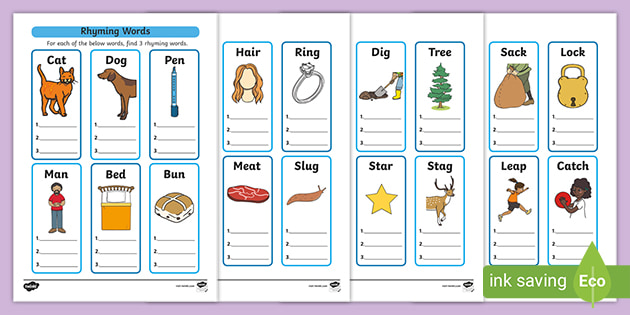 That’s because rhymes stick in your child’s brain more quickly than other types of spoken language.
That’s because rhymes stick in your child’s brain more quickly than other types of spoken language.
As your child hears the words, their mind breaks them down into sounds and makes connections between them. This connection between the words makes them easier to recall in the future.
Because of the impact of rhyme, many adults can still recite poems or songs they learned way back in elementary school.
2) Reading And Writing Benefits
If your child learns how to spell the word “fun,” it’s much easier for them to spell “run” correctly. Rhyming helps them pick up on patterns and word families, which can benefit them as they learn to read and write.
Finding patterns in words can unlock the world of reading for your child. They’ll discover success reading children’s books written in rhyme, which can be a huge confidence booster!
And, as they continue reading, they’ll be able to take what they’ve learned and apply it to non-rhyming words.
3) Phonological Awareness Development
Phonological awareness helps children identify and isolate sounds in words.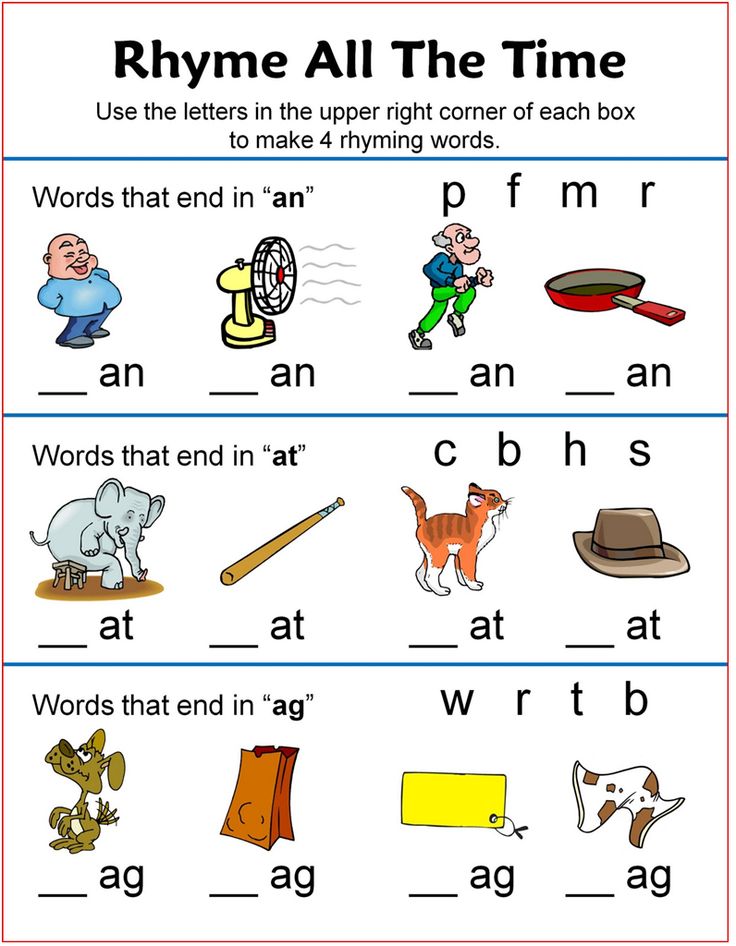
For instance, a child with phonological awareness will understand that the “all” sound in “ball” is the same “all” sound in mall, tall, hall, wall, etc.
Rhyming is one of the activities that can help develop this skill.
4) Listening Skills
Kids hear rhymes before they can read them. So, when you play with rhymes together, you help your child learn to listen to the different sounds in a word.
Listening is an essential skill that kids need to practice. As you work with your child on rhyming, they’ll be learning to use their ears to collect all of the information they need.
5) A Fun Way To Play With Language
Learning shouldn’t be boring, especially if you want to capture and hold your child’s attention. So, how do you bring some fun into it?
Rhyming words for kids can be an exciting way to do just that! When rhyming, your child is likely to engage more and, in the process, continue wanting to learn about language.
6) Cultural Literacy
Classic nursery rhymes and classic rhyming songs are a part of our culture.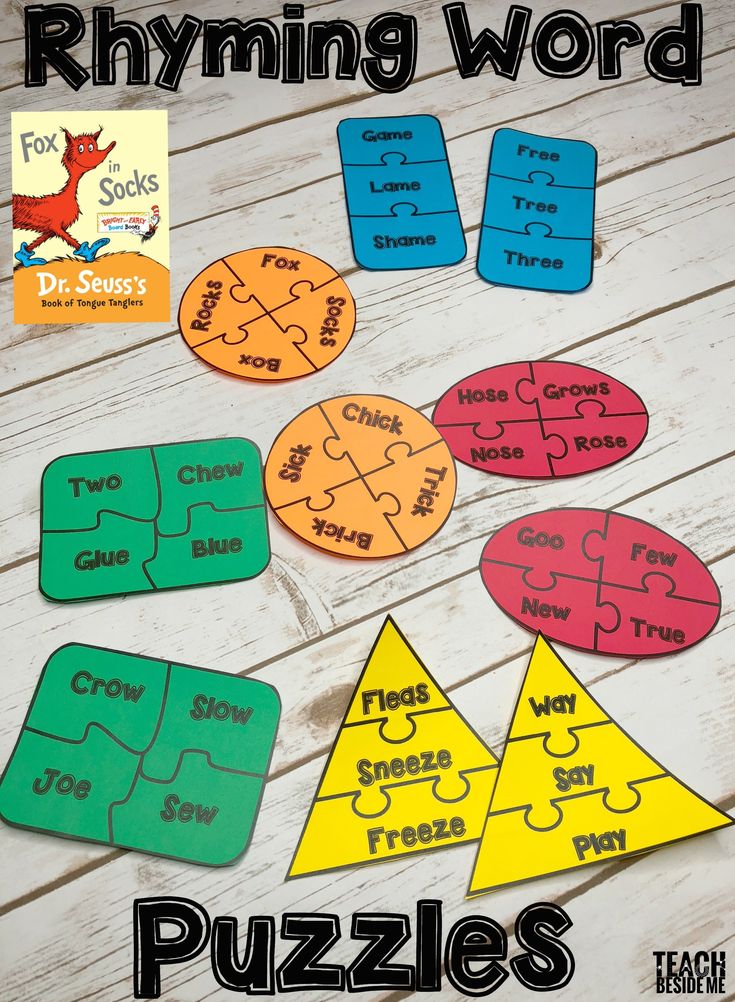
The more your child is exposed to them, the more comfortable they’ll be when they come across other literature in the future with references to familiar rhymes like “Hickory Dickory Dock” or “The Itsy Bitsy Spider.”
The Three Stages Of Rhyming
Like most language development skills, rhyming takes time to develop. While you’re on this journey, your child will go through the following stages.
1) Hearing Rhymes
Naturally, the first stage of rhyming is repeatedly hearing rhymes. Your child can’t learn this skill if they aren’t exposed to rhymes.
This exposure can be through songs, nursery rhymes, and children’s books. It’s important to point out any rhyming words to your child as you come across them at this stage.
For very young children, chanting rhyming words while clapping or swinging their arms or bouncing rhythmically (blue/shoe…blue/shoe…blue/shoe) can activate rhyming and be fun to do.
2) Recognizing Rhymes
The more your child is exposed to rhyming words for kids through the songs or the books you read to them, the easier it will be for them to begin recognizing rhymes.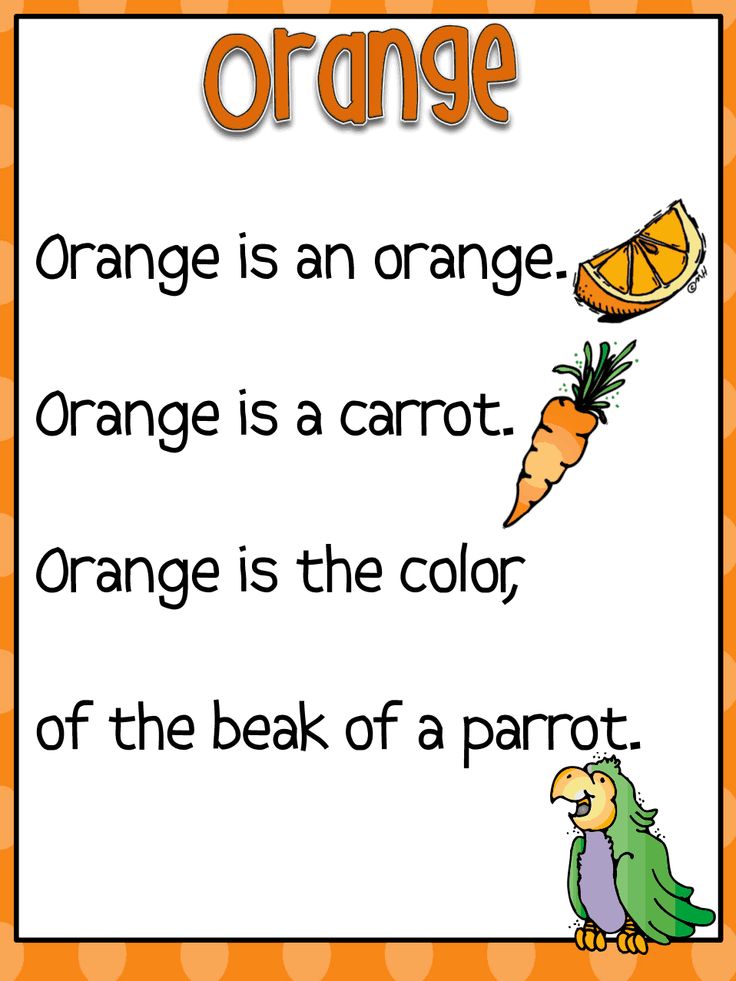
When your child starts pointing out which words rhyme in a song or book, they have reached the stage of rhyme recognition. During this phase, continue singing songs, sharing nursery rhymes, and reading rhyming books.
Once your child indicates that they’ve found a rhyming word, stop reading and let them show you. If they’re right, encourage them by saying, “Yes, those words end in the same sound; they rhyme.” Praise them for listening carefully and finding words that end in the same sound.
If your child makes a mistake, that’s OK! Gently correct them by saying, “I’ll repeat those two words. Listen carefully.” Then, say the two words aloud clearly. Finally, explain why the words don’t rhyme.
3) Creating Rhymes
So, you’ve been singing and reading to your child. You’ve helped expose them to different rhymes, and they have also started to recognize them.
The next stage is your child creating their own rhymes!
Children love making up nonsense rhyming words (like pickle/smickle), and you might get to see your child’s creativity as they try to use their knowledge and understanding of rhymes to produce their own.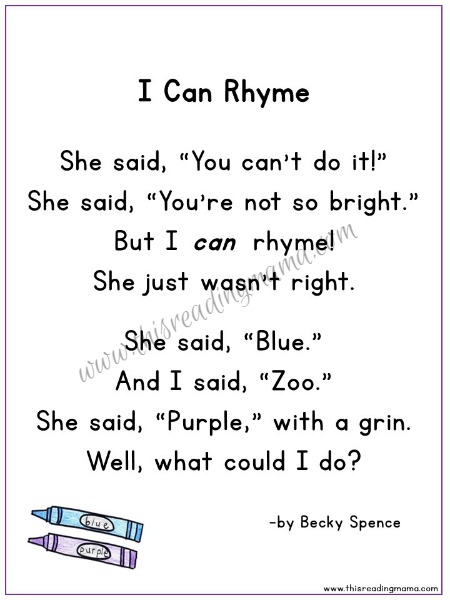
Don’t be surprised if they ask you questions like, “Do you know what rhymes with talk? Walk!” During this phase, your child might also show interest in writing their own books with rhyming words on the pages. Encourage them to let the creative juices flow!
The more your child practices, the better they’ll become at making their own rhymes using rhyming words.
Why Might A Child Have Trouble With Rhyming?
Some kids pick up rhyming quickly and easily. Others require a lot more repetition before they can recognize or create rhymes.
If your child is having some trouble, here are four common culprits.
1) They Haven’t Yet Developed Phonological Awareness
Phonological awareness is an umbrella term that includes the development of segmentation, rhyming, and blending syllables.
As we mentioned, some kids pick this important skill up easily, while others may need a little more practice to get the hang of it.
If you suspect that your child isn’t ready to rhyme, that’s OK! Slow down a bit, and read plenty of rhyming books together.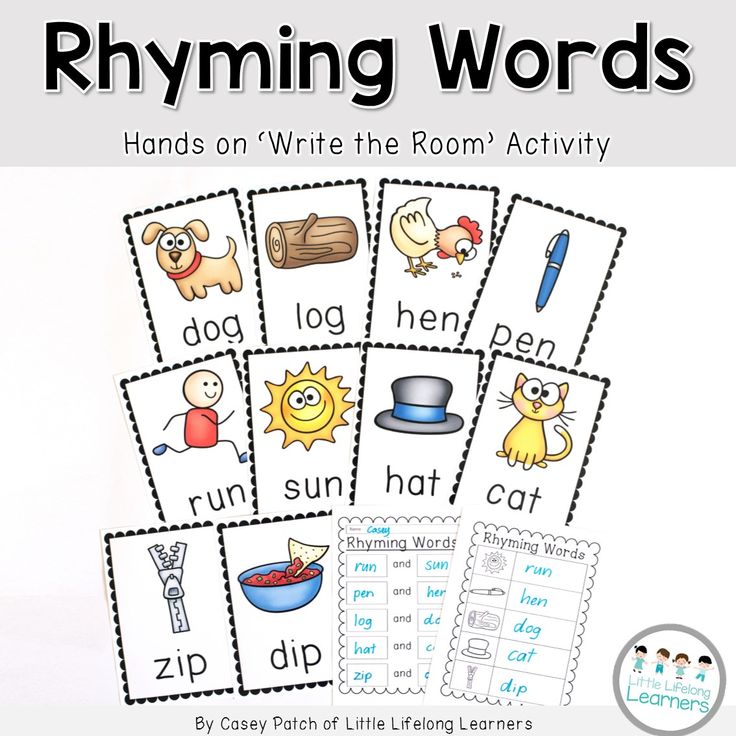 Talk about the words and point out the sounds the letters make in them.
Talk about the words and point out the sounds the letters make in them.
Using the HOMER Explore Letters Kit is another great way to practice. Build a word with the magnetic letters. Then, create another word that rhymes by swapping out the first letter. Encourage your child to make another word that rhymes with the first two.
As you help them gain confidence with the alphabet and the sounds letters make, you’ll equip your child with the skills they need to rhyme.
2) They Might Be Confused About Which Words Need To Rhyme
In some books, the words that rhyme are at the end of consecutive lines. But sometimes, alternating lines rhyme. And other times, the rhymes are at the beginning of a sentence, not the end.
All of this inconsistency in rhyming patterns can be confusing to a child who is trying to learn this skill.
To practice, work together to find rhyming words and see where they are. This can teach your child to look for patterns in words, which can help them become a better reader.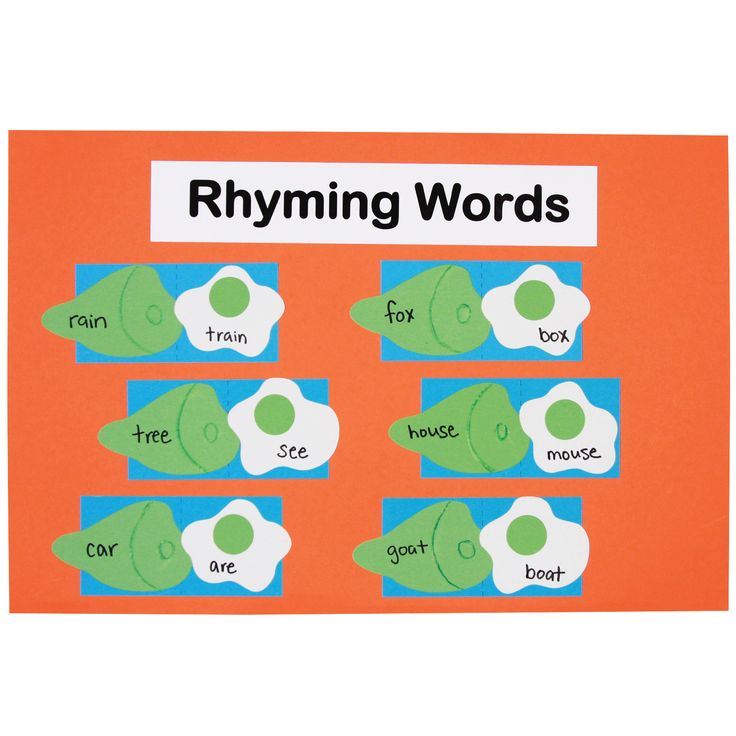
3) They Might Have Trouble Focusing
For any child to learn rhyming words, they need to be able to focus on the activity so they can pick up on the different sounds and rhythmic patterns.
If your child quickly loses interest in the activity you’re doing together, they might not hear you when you highlight that “look” rhymes with “book.”
To help, make sure you’re working on age-appropriate skills. If your child is a young toddler, they might not be developmentally ready for rhyming. Wait a little longer, and then try again.
If your child is ready to rhyme and just loses focus, try a different type of activity. For example, play a rhyming game or read a book they enjoy. Again, doing something that interests them can help hold their attention.
4) They Confuse Which Part Of The Words Are Supposed To Rhyme
Some kids may get mixed up because they think words that start with the same letter rhyme.
If your child says that moon and milk rhyme, they’re on the right path.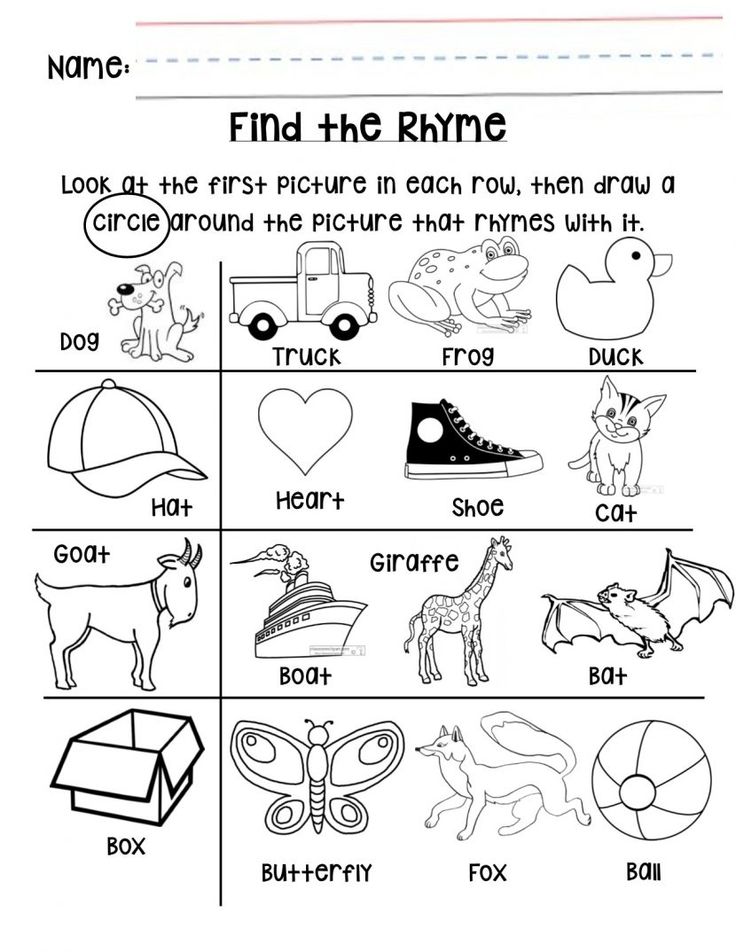 They understand that part of the two words needs to match; they’re just confused about which part.
They understand that part of the two words needs to match; they’re just confused about which part.
To help your child overcome this, start emphasizing the ends of the words when you point out rhyming words for kids. Instead of saying, “Pig and wig rhyme,” say, “p/IG and w/IG rhyme.”
This pulls the focus to the end of the word. It may take time, but keep practicing, and you’ll help your child master this skill!
Helping Your Child Develop Their Rhyming Skills
The above are some of the common reasons why your child may not have mastered rhyming just yet. But now that you understand the importance of rhyming, how can you help them acquire this skill?
These eight fun rhyming activities can help reinforce the concept for your child.
1) Recite Nursery Rhymes
Nursery rhymes are not just for babies! They can actually play an essential role in young children’s language development. That’s because they help kids hear the different syllables and sounds in language.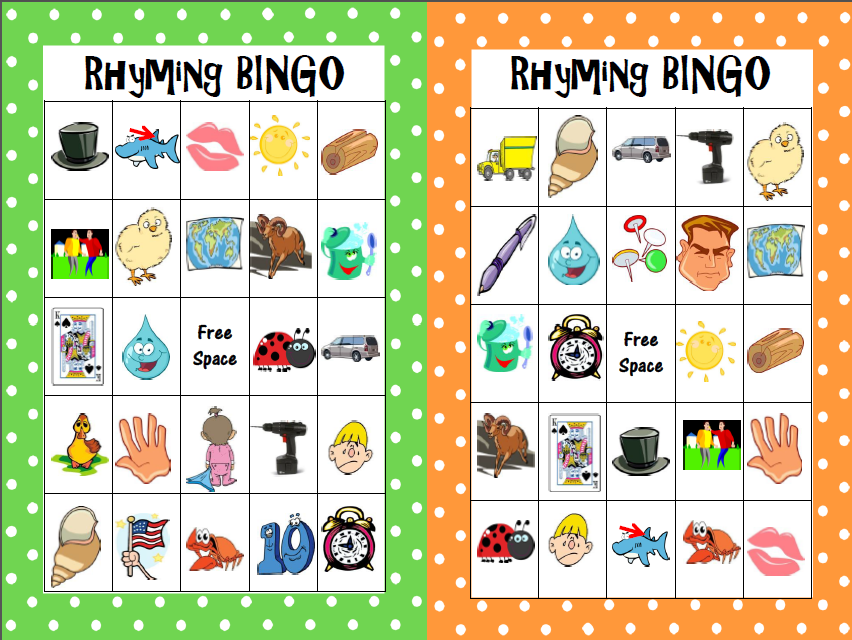
A fun activity to enhance learning during nursery rhymes is to play fill in the blank. Simply recite a nursery rhyme out loud and leave your child to fill in the last word.
For example, “Humpty Dumpty sat on a wall. Humpty Dumpty had a great…”
The proper ending is the word “fall.” If your child doesn’t get it at first, that’s OK. Repeat the sentence, adding the word they suggested to the end. Then, ask your child, “Does that sound right?”
If not, say it the correct way and point out that “wall” and “fall” rhyme.
It can also be fun for the adult to say what comes next and supply a completely wrong word. Your child will get a kick out of the silly answers you come up with!
2) Sing Songs That Rhyme
Many popular and age-appropriate songs also rhyme. So, why not point out the rhymes when watching TV or listening to music?
As we’ve mentioned, the more children are exposed to rhymes in different forms, the easier it will be for them to fully grasp the concept of rhyming.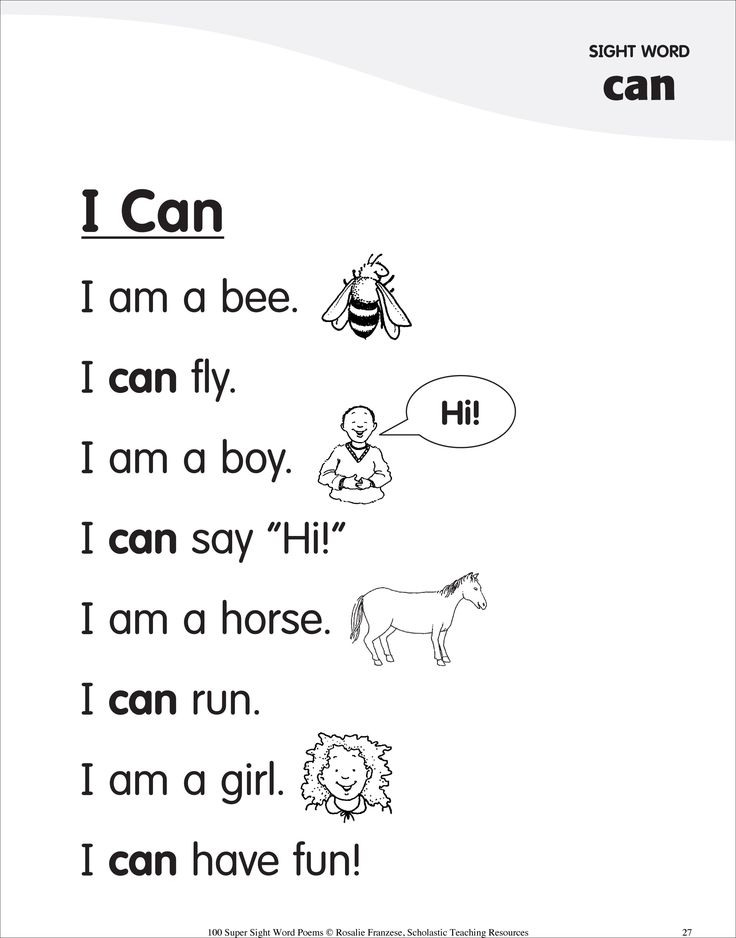 Noticing rhymes in your day-to-day activities is a great way to accomplish that!
Noticing rhymes in your day-to-day activities is a great way to accomplish that!
There are so many fun, silly songs that rhyme. Here are a few of our favorites:
- Down By the Bay
- I Had a Little Turtle
- 5 Little Monkeys Swinging in a Tree
- On Top of Spaghetti
- If All of the Raindrops
- Do Your Ears Hang Low?
Pick one song at a time to work on, and sing it often — during car rides, while setting the table, or in the bath. This way, your child becomes familiar with the words and the tune.
Once they know the lyrics, pause where a rhyming word goes and ask them to say what comes next. Let them say it, and then keep singing.
When you have one song down, pick another to learn. Each time you sing a rhyming song, you’re helping your child master the skill of rhyming.
3) Read Poetry
Poems are a wonderful way to engage in rhyming words for kids. This is also an opportunity to expose your child to different and diverse literature.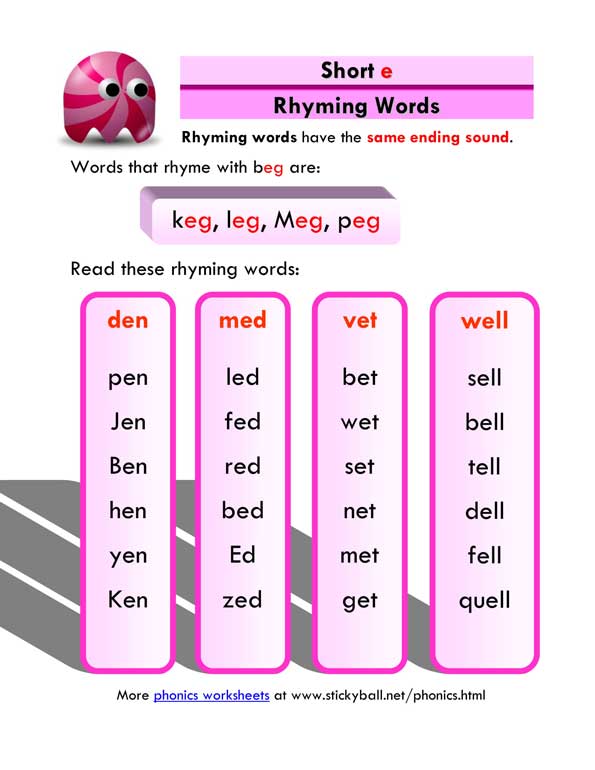
For instance, Lucille Clifton, Nikki Grimes, and Nikki Giovanni are some poets who’ve written incredible poetry for kids.
There are also many children’s books written partially or totally in rhyme, such as the “Llama Llama” books. The idea here is to continue exposing your child to different forms of rhymes.
For a bit of fun, consider hosting a family poetry night. Let everyone pick a favorite poem to share. Then, spend a few weeks memorizing the words. On poetry night, take turns reciting your poems and listening to each other.
Alternatively, you can use this night to read several poems from different poets. That way, your child can hear a variety of poems and listen to the different ways each poet uses the English language.
You may even want to incorporate poetry into your bedtime reading routine, too!
4) Play Rhyming Word Games
There are plenty of ways to help your child learn to rhyme while still having fun!
For instance, you can use the letters in the HOMER Explore Letters Kit to spell out a word ending in -at.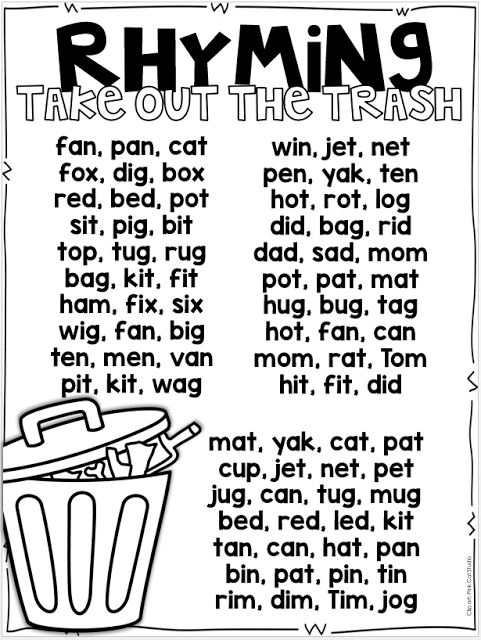 Put the letters “at” on the board.
Put the letters “at” on the board.
Your child now needs to place letters at the beginning to create words that rhyme (cat, hat, bat, mat, etc.). See how many they can come up with for a prize!
You can also play rhyming games when you’re out and about. Pick a word and say it aloud. Ask your child if they can think of a word that rhymes with it. Then, add your own word that rhymes.
Continue playing, alternating who speaks, until no one can think of another rhyming word. Have your child pick a new word and begin again!
5) Rhyme With Pictures
Images can help summarize chunks of information into smaller and easier to process content. You can take advantage of this by using picture books.
Pictures of a hat, cat, or mat may not expose learners to how these words are written, but it allows them to start learning the basic concept that rhyming words sound similar.
You can also create custom picture cards with a pack of index cards. Draw a simple, easily recognizable object on each card. Here are some words to use for your pictures:
Here are some words to use for your pictures:
- Moon
- Spoon
- Bear
- Chair
- Cat
- Hat
- Ring
- Swing
- Dog
- Log
Once you have your cards made, you can use them in various ways. For example, you might spread them out upside down and play Memory with your child. Take turns flipping two cards at a time. Say the two words aloud. If they rhyme, keep them. If not, flip them back over.
You can also hide one word from each matching pair around the room. Hand your child one of the other ones and say, “Can you find a card with a picture of something that rhymes with ‘ring?’” Then let them search around the room to find the right card.
6) Act It Out
Instead of just reading or singing a rhyme, acting it out can help a child not only remember the rhymes but also have fun in the process!
Whether you’re acting it out, singing, reading, or using picture books, the more you expose your child to rhymes, the quicker they’ll grasp the concept.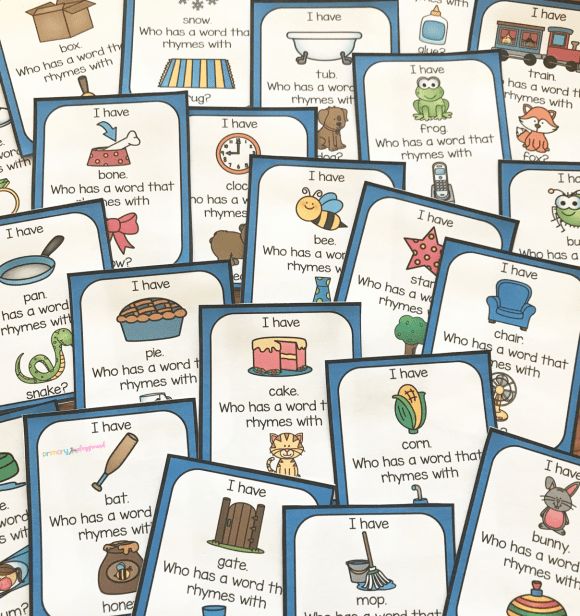
7) Rhyme Nonsense Words
Nonsense words are words that aren’t actual words. For example, the word “thirp” is a nonsense word.
Teachers often use nonsense words to help students learn specific skills, including the developing the power of the hour: rhyming.
Say a nonsense word and ask your child to think of a real word that rhymes. Here are a few words you can try:
- Vlat
- Trun
- Splew
- Ploon
To make it even more fun, pretend to be a robot or an alien. Then, ask your child to help you translate your language into English by coming up with a rhyming word.
8) Make A Rhyming Basket
Look around your house for items that rhyme, and put them in a large basket or box for your child to use. They can sort objects, create a story with the rhyming words, draw them, or use their imagination to interact with the rhyming words in a new way.
Here are a few ideas of common objects that rhyme:
- Sock, block
- Pan, can
- Jar, car (a toy one, of course!)
Have your child brainstorm more items that rhyme to put in the basket.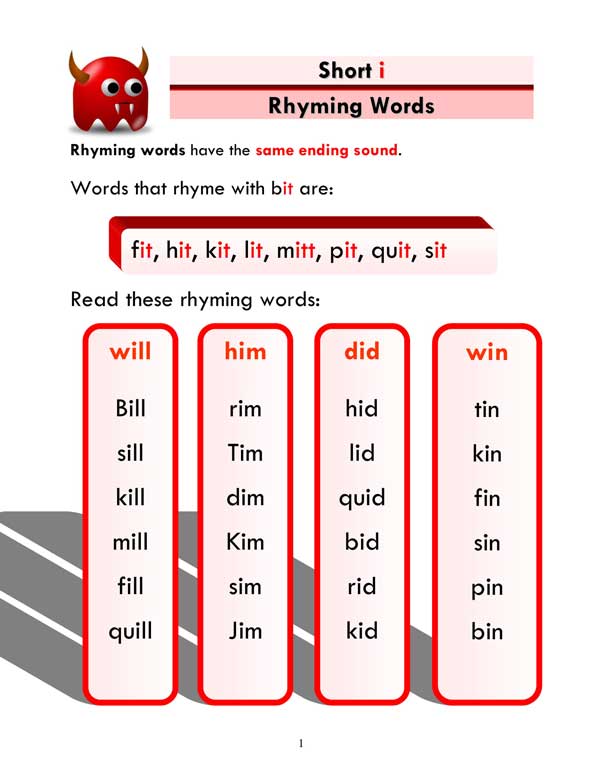 Since these things will get played with, make sure the items are kid-friendly and safe.
Since these things will get played with, make sure the items are kid-friendly and safe.
Books With Rhyming Words For Kids
We’ve already mentioned a few authors who have created some incredible children’s books that rhyme. Here are a few other popular options that your little one can also enjoy:
- There’s A Wocket In My Pocket!
- Here’s A Little Poem
- Llama Llama Red Pajama
- Madeline
- Rhyme Crime
- Baby Boo, I Love You
- I See The Moon: Rhymes For Bedtime
- Giggly Wiggly: Playtime Rhymes
It’s Time To Rhyme With Rhyming Words For Kids!
Rhyming words for kids are a fun and creative way to lay a solid foundation for literacy.
So, remember to continue reading children’s literature and singing all the fun nursery rhymes you can think of. As your child gets more comfortable with the rules, don’t be surprised when they start creating their own unique rhymes!
To help your young learner develop other important skills, you can also check out Homer’s Learn & Grow App, which helps kids develop their reading, creativity, thinking skills, and so much more.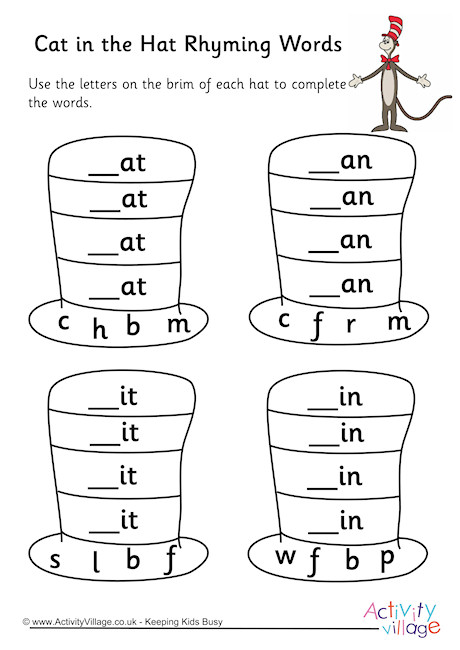
Author
23 common words that don't rhyme (actually rhyme)
Article
upper limit-leaders' >
You've no doubt heard the old fact that nothing rhymes with orange . But in fact, the English surname Gorringe is like that of Henry Honeychurch Gorringe, the captain of the USS. Gettysburg - rhymes with orange . And so does Blorenge , the name of a hill in South Wales. But even if proper names such as surnames and place names are excluded, this still leaves sporang , an obscure name for the sporangium, the spore-producing part of the plant. So while it might all depend on your accent, how obscure the word you're willing to accept, and where exactly the stress falls in the word (because sporang can rhyme with orange or be pronounced "spoh- Range ”) seems to actually have a rhyme for orange .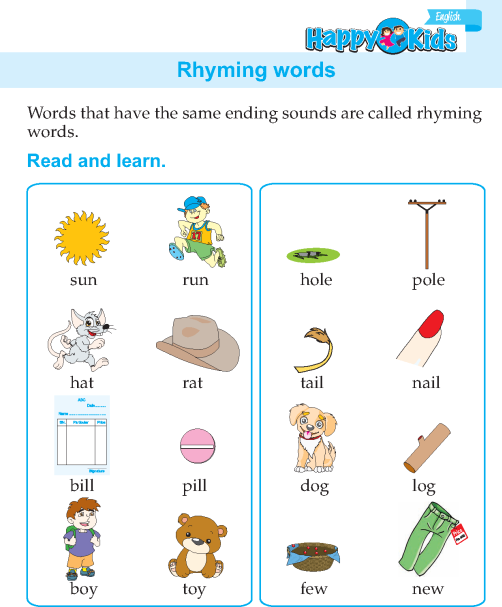
In fact, although they often end up on lists of notoriously non-rhyming words, all of the words listed here have rhymes in English—assuming bizarre dialectal words and obscure scientific jargon are allowed.
1. Caustic rhymes with epacrid (in some pronunciations) the name of any plant of the genus Epakris , most of which are found in Australia.
two. worry partially rhymes with both phalanx meaning "in line" and grateful an old word meaning "thank".
3. Beige is pronounced to sound more like the first syllable of Asia than similarly spelled words such as age , measure , scene 0.07 rage , and 07 rage . But this does not mean that there is no rhyme in it; there are also gray , the name of a dull color in an undyed fabric.
Four. Bulb rhymes with Culb , an obscure 17th-century word for objection or harsh response.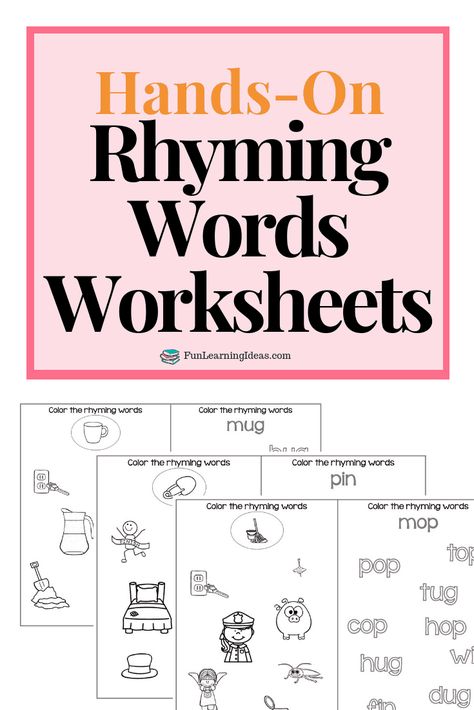
5. Chaos rhymes with naos , the name of the innermost part of a Greek temple, and Speos , an Egyptian tomb built into a cave.
Samuel L. Jackson hold on to your
6. Circle rhymes with rumble , an old dialect word meaning "pull arms and legs towards the body", as well as both heterocercal and homocercal , two zoological terms describing fish tails that are either asymmetrical or symmetrical respectively.
7. Circus is a homophone, cercus , which is the name of an appendage on the body of some insects, and therefore rhymes with cysticercus , another name for a tapeworm larva. If it's too obscure, why not try rhyming it with the word cloudy is a 17th century word meaning "lack of thumb".
8. Concierge is a direct borrowing from French, so the number of English words it can rhyme with is already limited.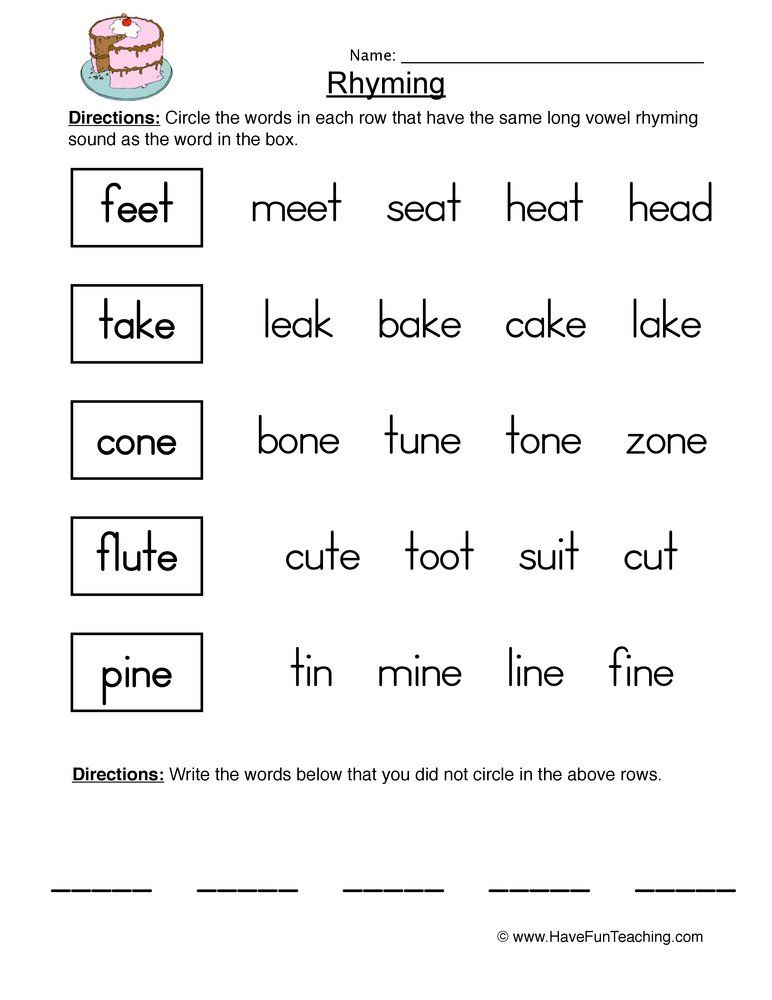 But there is half-virgin , another French loanword used as an old-fashioned name for a virgin young woman - or as Merriam-Webster explains: "a girl... who utters obscene or obscene words and usually promiscuous caresses, but retains virginity". It literally means "half-maiden".
But there is half-virgin , another French loanword used as an old-fashioned name for a virgin young woman - or as Merriam-Webster explains: "a girl... who utters obscene or obscene words and usually promiscuous caresses, but retains virginity". It literally means "half-maiden".
9. Stupid rhymes with hit , a dialect word for flattened, pounded meat or a sudden strong blow, among other definitions.
10. False rhymes with false , which is an alternative name for waltz, according to the Oxford English Dictionary.
eleven. Film rhymes with film , an old Southern English word for dust or fine powder.
12. Mud rhymes with both shed which is the amount lost in spilling the drink (or the spill itself) and plowing which means toil or labour.
13. Gouge rhymes with curse which means "crowd or lament".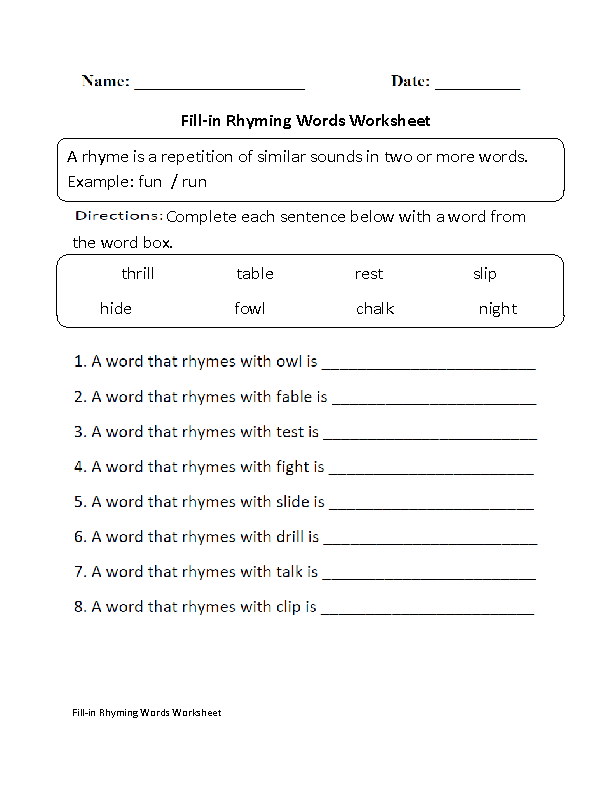 In 19th-century college slang, cursed was also a long, boring, or difficult lesson or job.
In 19th-century college slang, cursed was also a long, boring, or difficult lesson or job.
14. bay rhymes with both sera , which is another name for flax toad plants, and hunt , an old Southwest English word for loose feathers coming out of pillows and cushions.
what is the rarest gem in the world
fifteen. Music rhymes with both old and dysgeusia , both of which are medical words describing, respectively, a complete or slight impairment of a person's taste sensations.
16. Violet rhymes with Hirple which means "to limp" or "embarrassing to walk" and curly , an old Scots word for a leather strap that goes under a horse's tail to secure its saddle (this also more broadly meaning "buttocks").
17. Replenish rhymes with both irritate which means "remove furniture" and Rhine which means "pertaining to the river Rhine".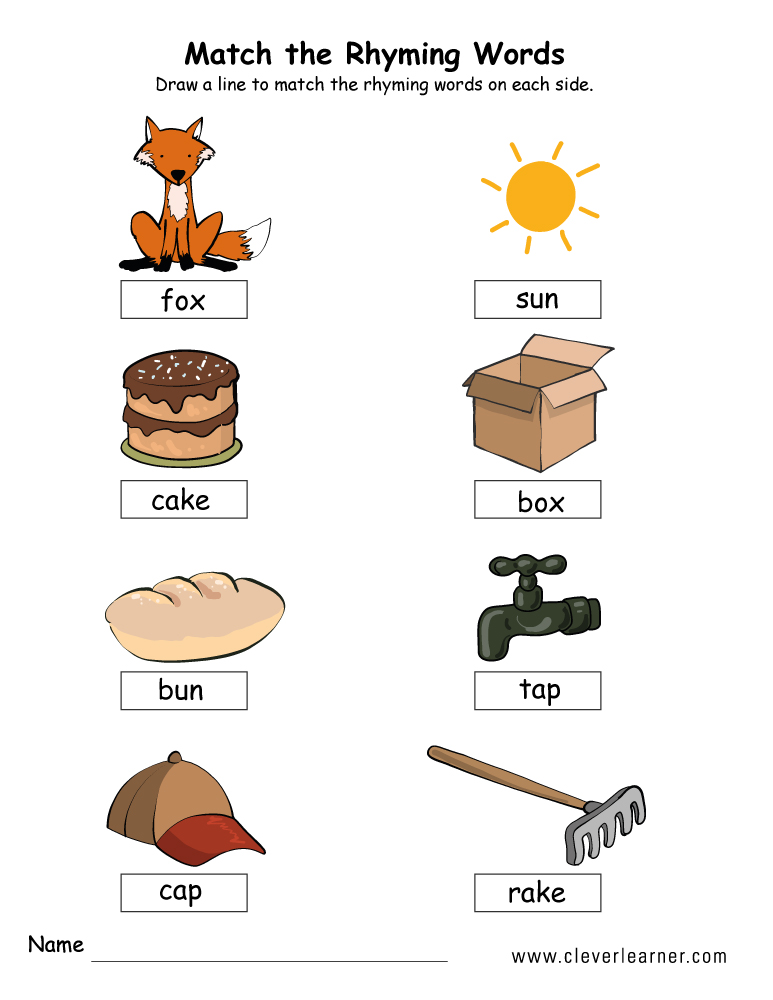
18. Rhythm rhymes with the English place name Litham as does Smitham , an old word for fine malt dust or powdered lead ore.
19. Silver , after purple and orange , is the third of three English colors, presumably without rhyming. But there is child , an old dialect word for lamb.
twenty. Wasp rhymes with both cosp , a clasp for fastening a door or gate, and Knosp , an architectural ornament resembling a tree bud.
how did magnum pi die?
21. Width rhymes with width , an English dialect word that is variously used to refer to the length, depth or width of something - or literally the length of one side.
22. Window rhymes with tamarind , a Spanish-American drink made from boiled and sweetened tamarind fruit.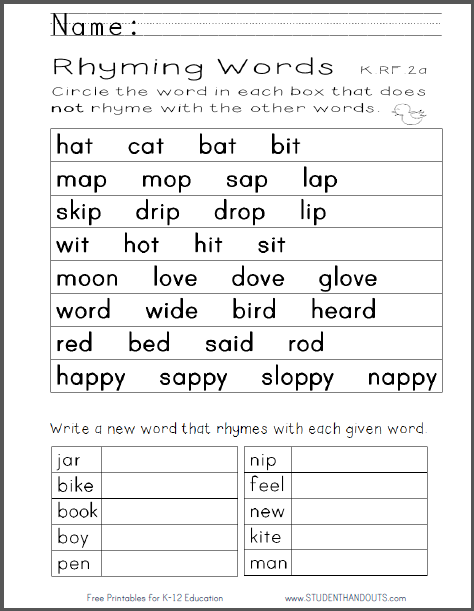
2. 3. Women rhymes with both Timon , an old word for a ship's rudder, and dim , meaning "to grow dim" or "to set like the sun." Woman however has no rhyme at all. (Probably.)
A version of this list was first published in 2015.
Meaning, Definition, Suggestions . What are rhyming words
- Online translator
- Grammar
- Video tutorials
- Textbooks
- Vocabulary
- Professionals
- English for tourists
- Abstracts
- Tests
- Dialogues
- English dictionaries
- Articles
- Biographies
- Feedback
- About project
Examples
Meaning of the word "TO RHYME"
The same as to rhyme (in 1 value).
See all meanings of the word rhyme
The meaning of the word «WORD»
A unit of speech used to express a separate concept.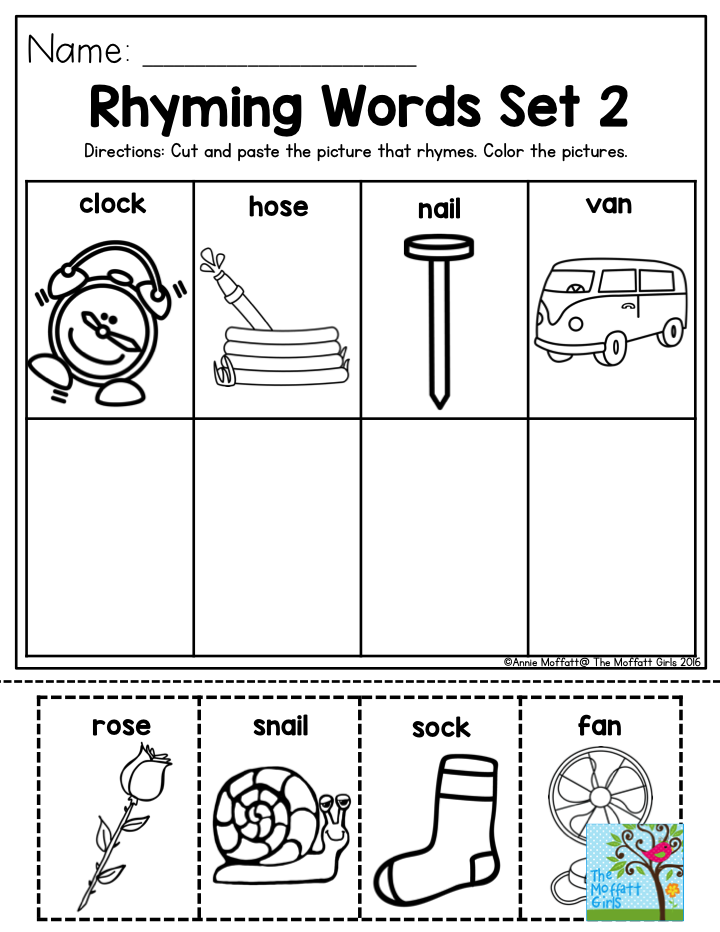
See all meanings of WORD
Rhyming sentences
| When the Texan was brought into the room, Yossarian was busy erasing rhyming words from letters. | |
| Other results | |
| It can also be combined with other memorization methods such as rhyming, word substitution, or the method of loci. | |
| Your ability to draw eyes, or how many words do you know that rhyme with sadness in emo songs? | |
| "I'm not offended," Paint commented on the announcement. “I will keep this iron mumbler of rhyming words company and diligently guard your gun, saber and shield. | |
| The use of rhyming words can make aphorisms more truthful and memorable by using the effect of rhyme as cause and ode mnemonics. | |
| Emceeing is rhythmic rhyming and word play, first without accompaniment, then with rhythm. | |
| Eventually, this introductory role developed into longer sessions of spoken, rhythmic wordplay and rhyming that became rap. | |
| The group is known for its colorful imagery, complex wordplay and complex rhyme schemes. | |
| Other elements indicative of Wulfstan's style include word or sentence parallelism, alliteration, and rhyme. | |
| I don't see any pictures in the rhyme, so how can he use pictures to represent words? | |
| After all, magic is when words suddenly add up into rhymes, and poems are obtained. | |
| Texas, KAMAZ... these words rhyme. | |
| Ff, these words don't rhyme. | |
| Just think, you can strum the guitar and rhyme words. | |
| I thought the words of that rhymer would put you at ease. | |
| Escape words that rhyme with words in the final stop must be reconstructed with final clusters *-ks, *-ts or *-ps. | |
| The use of the word nutmeg for foot in cockney rhyming slang has also been put forward as an explanation. | |
| When words did rhyme, VP was more likely to say they rhymed, especially if the words also looked like they should rhyme. | |
| In addition, some words do not rhyme perfectly in English, requiring the use of oblique rhymes. | |
| Crumbo is a rhyming game that, according to Joseph Strutt, was played as early as the 14th century under the name Aristotle's ABC. | |
| When rhyme surprises and expands fixed relationships between words, that itself protests against necessity. | |
| Homophones, being words with different meanings but the same pronunciation, are an example of the same rhyme. | |
| The English actor and linguist John Walker used the spelling ar to denote the long vowel aunt in his 1775 rhyming dictionary. | |
| The earliest entry of naip is from Jaume March II's Catalan rhyming dictionary in 1371, but without any context or definition. | |
| The use of the term MC when referring to rhyming vocabulary comes from dance halls in Jamaica. | |
| Crumbo in the nineteenth century evolved into a word game in which one player came up with a word and told the others what it rhymed with. | |
| You know, my mom used to call you and me Jay-Z and Byonsae. 'cause I move pretty and you rhyme dirty words. | |
| Charmolue hesitated for a minute, like a poet looking for a rhyme for his verse. | |
| This cockney dialect word rhymes slang and tends to raise eyebrows when used outside of this context. | |
| Class mottos usually have verbiage that rhymes with or is phonetically similar to their class of the year. | |
This page contains the definition (meaning) of the phrase / expression "rhyming words", as well as synonyms, antonyms and sentences, if they are available in our database.